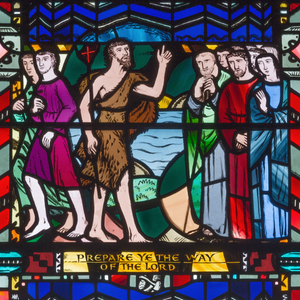
“You brood of vipers!”
“…every tree that does not bear good fruit will be cut down and thrown into the fire”
“…the chaff he will burn with unquenchable fire”
John does not mince words.
It can be easy to put figures in the Bible or even saints on a pedestal (especially when they are often depicted that way), but John’s words serve as a reminder that that they too were human. Even John the Baptist snapped and called people a “brood of vipers.”
With these stark phrases, and a bedraggled appearance featuring camel’s hair clothing, John doesn’t seem to be a warm and fuzzy figure welcoming people with open arms. And yet what he lacks in appearance, he more than makes up for in ardor.
In reading this passage, I can’t help but try to put myself in John’s position. Was it lonely to be the first prophet sent to Israel in four hundred years? What was it like to baptize so many people? Was he anxious? Exhausted? What did it feel like to be aware that he was laying the groundwork for someone “mightier” than him—someone whose life would eclipse his own? How much pressure did he feel to prepare the people for the coming of Jesus? What did his voice sound like when he urged the people to repent?
When I imagine John urging the people to “Repent, for the kingdom of heaven is at hand!” I immediately think of what we are told to do when we receive ashes on Ash Wednesday. “Turn away from sin and be faithful to the Gospel.”
Why, during Advent, are we being called on to repent?
The root meaning of “to repent” is “to turn,” referring to a dramatic transformation of heart and a new direction. In the Old Testament, repentance or “teshuva” in Hebrew, was often used to urge Israel to return to a right relationship with God. Rather than state of mind, it is a choice. Teshuva goes beyond apologizing once or stopping a certain behavior. It is an active and continuous decision to turn away from where you are going and to return to God.
With the impending coming of Christ, John offers people a choice, they can acknowledge their sins and move towards the realm of heaven. Or they can continue down their same path away from God, and be condemned at the final judgement.
We too are called to accept responsibility for our sins, show remorse and commit to a new path—one that leads us towards the kingdom of heaven. While we might associate repentance with Lent, John’s message serves as a reminder that repentance is a continuous process and not something we can pack away in a box and only take out during Lent.
We might be tempted to dismiss John’s accusation against the Pharisees and Sadducees, believing we would never act like them.
But, in our daily lives, how often do we slip into a similar trap of “presumption,” going through the motions, checking off the boxes, content to believe we are “all set” for the kingdom of heaven. We might attend Mass every Sunday, but how often do we leave our beliefs at the door when we exit?
During this time of Advent, as we prepare for Christ’s birth, we are called to evaluate the ways we conduct our lives and repent.
The idea of a total transformation might sound daunting, so what if we start small?
What one change can we each commit to making today to actively reorient ourselves towards God (and avoid becoming a “brood of vipers”)?



